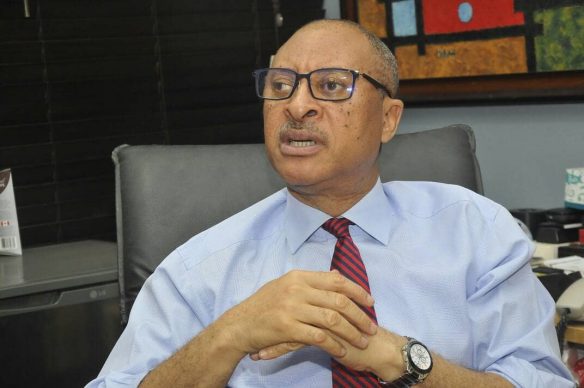The All Progressives Congress (APC) and Professor Pat Utomi engaged in a heated exchange over Utomi’s characterization of the Nigerian experience under President Bola Tinubu as mirroring the fascist conditions of Nazi Germany. The APC vehemently denounced Utomi’s comparison, labeling it as reckless, irresponsible, and insensitive, particularly coming from someone of his stature. The party underscored Utomi’s continued enjoyment of fundamental freedoms, including his ability to announce a shadow government without repercussions, as evidence contradicting his claims of oppression. They further attributed Utomi’s critical stance to his string of electoral defeats and perceived political frustration, stemming from his failed gubernatorial bid in Delta State, his unsuccessful involvement with the Labour Party in the 2023 presidential election, and his unsuccessful attempts at establishing a formidable third-force opposition.
The APC also addressed Utomi’s criticism of the fuel subsidy removal, highlighting that other prominent political figures like Atiku Abubakar and Peter Obi also campaigned on this policy. They argued that Utomi’s exploitation of the initial hardships associated with the policy reflected political opportunism rather than genuine concern. The APC further rejected Utomi’s implication that the ruling party was obligated to assist opposition parties with their internal struggles, emphasizing that they bore no responsibility for the internal affairs or potential disintegration of other political entities. The party maintained that the decision of individuals to switch allegiances was a matter of personal choice within the democratic framework.
In response, Professor Pat Utomi defended his decision to establish a shadow government, clarifying that it was a constitutional exercise designed to amplify citizens’ voices and offer alternative policy proposals, not an attempt to usurp power. He stressed that the shadow government, operating under the Big Tent coalition, was a civic instrument for participatory governance, with a shadow cabinet mirroring ministerial portfolios solely for policy critique and reform suggestions. Utomi emphasized that the initiative operated transparently and lawfully, aligned with constitutional rights guaranteeing freedom of expression, association, and accountability, and focusing on public engagement and grassroots consultation. He clarified that the shadow government held no executive or legislative power, distinguishing it from the actual government.
Utomi further elaborated on the shadow government’s intentions, emphasizing its focus on constructive engagement with the government and the public. He clarified that the initiative was not a protest movement, but a platform to rebuild trust in governance through integrity, imagination, and inclusive dialogue. He outlined the shadow government’s priorities, which included stimulating production, formulating a coherent economic growth strategy, decentralizing security, and pursuing constitutional reform. He emphasized the cabinet’s focus on providing alternative policy proposals in areas like healthcare, education, infrastructure, law and order, and policy monitoring, emphasizing the need for platforms for civic engagement without suppression of voices seeking reform.
Utomi reiterated that the shadow government held no legislative or executive power and did not control any resources or security apparatus. He clarified that its function was to serve as a repository of ideas, offering policy alternatives to address Nigeria’s socio-economic challenges, which he viewed as a democratic exercise rather than a treasonous act. He argued that the initiative was born out of the perceived silence and internal divisions within opposition parties amid worsening insecurity, inflation, corruption, and youth despair, aiming to reinvigorate the republic’s soul through collaborative nation-building. Utomi underscored the need for high ethical standards within the coalition, emphasizing the need to prioritize listening and service over political theatrics and personal ambitions.
He extended an invitation to the government to engage with the initiative, viewing it not as a threat but as an opportunity for collaborative nation-building. Utomi called on the government to engage with the shadow government’s proposals and listen to its perspective rather than reacting defensively. He also called upon citizens to recognize the shadow government not as a parallel government but as a platform for shared responsibility in governance, urging them to contribute to the vision for a better Nigeria. Furthermore, he called upon the media and civic institutions to scrutinize the initiative fairly, evaluating it on its merits rather than solely on its novel nature. Finally, he named members of the shadow cabinet, including Dele Farotimi as head of the Ombudsman and Good Governance portfolio, and other experts in various fields to constitute the policy delivery unit and other cabinet positions.


